Here is the weekly roundup of activity from Laura Stack’s blog, columns, podcast, and other featured articles. Scroll down to read the complete roundup of productivity resources to help you create Maximum Results in Minimum Time. This week on the Blog Quick and To the Point: Texting and Instant Messaging Protocols in the Workplace Communication may be the most important factor in any partnership, and it’s certainly a glue that binds a team together. But it comes in many forms, especially in the workplace. Two of those are texting and Instant Messaging (IM), which are common means of modern business communication today. How do we make the best use of each in a teamwork environment? Read the full article. This week on LinkedIn: Pairing Up: The Advantages of a Team of Two at Work Though … [Read more...]
Pairing Up: The Advantages of a Team of Two at Work

"Alone we can do so little; together we can do so much." – Helen Keller, American deaf-mute activist. Though we rarely think of them as such, a duo is still a team, and it can have many advantages. When your team is only two people, it’s much easier to communicate and agree on everything, from project requirements to what to have for lunch. Small(er) teams also tend to produce more per capita (per the two-pizza rule). However, two-person teams must be more careful about avoiding groupthink and poor decision-making. Some business duos have become household names: just a few examples include Steve Jobs and Steve Wozniak in computing, Sheryl Sandberg and Mark Zuckerberg in social media, Warren Buffett and Charlie Munger (the silent partner) in investing, and Sergey Brin and Larry Page in … [Read more...]
Respectful Creativity: Encouraging Different Viewpoints on Your Team

“One of the most sincere forms of respect is actually listening to what another has to say." – Bryant H. McGill, American self-improvement writer and speaker Effective teams are most often led by leaders who expect innovation and therefore encourage diverse viewpoints. (click to tweet) This is no secret, despite the fact that—as cynics will surely point out—we rarely practice the concept adequately, and I would agree. However, we also let pettiness, bureaucracy, groupthink, disengagement, laziness, and other failings hinder our creativity and slow us down. Business as usual runs down and crushes flexible creativity. When I think of respectful creativity, I think of Steve Jobs and Apple. Steve Jobs was no saint; he had his flaws, but that just makes his story all the more amazing. The … [Read more...]
The Motivated Coworker: How to Increase Team Productivity Even When You’re Not the Team Leader

“People often say that motivation doesn't last. Well, neither does bathing - that's why we recommend it daily.”—Zig Ziglar, American motivational speaker and author. Active, participative teamwork has become crucial to the modern business environment. Gone are the days when one person could anchor a team by doing everything well—or doing everything, period. Even superstar athletes like Labron James and Sidney Crosby depend on the talents and hard work of their teammates to excel. Modern business is too complex to know or do it all; this has necessarily led to specialization. We need capable people in multiple slots to accomplish specific business goals, no matter how narrow those goals—especially in this era of business agility. Ideally, your supervisor would tie you all together … [Read more...]
Playing By the Rules: Establishing Procedures for Resolving Team Conflicts
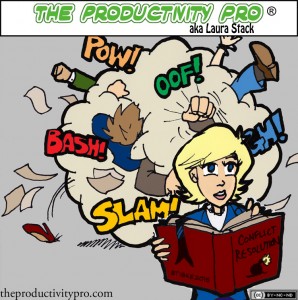
"You have to learn the rules of the game. And then you have to play better than anyone else."—Albert Einstein, German-American physicist. With rare exceptions, first-time ballerinas don’t perform a perfect Swan Lake, inexperienced writers don’t produce their magnum opuses immediately, and brand new teams don’t slide effortlessly into perfect productivity. There’s always a learning curve, a period when individual members test their boundaries, discover where their jobs end and others begin, and yes, figure out the pecking order. You can expect some delay before high performance emerges, but you can speed the process by setting ground rules—specific procedures to ensure that all team members play well with each other. Effective teams know how to work towards mutual resolution, even when … [Read more...]
Coworker Codependency: The Value of Teams
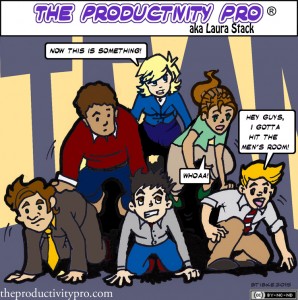
It's unfortunate that the term "codependent" has taken on such negative connotations over the past few decades, because otherwise it would be ideal for expressing the value of teamwork. Indeed, I would argue that all teams are codependent to some extent, in that each of us depends on our teammates to do their jobs promptly and professionally. In this sense, "codependent" works in the same spirit as "cooperation," since we help our teammates—our coworkers—function at the height of their productive abilities. Perhaps a less loaded (if less accurate) term for this relationship would be "interdependent." Each team member, from the leader down to the summer intern, engages with each other to produce the most product possible in the least amount of time. Ironically, teamwork is both the … [Read more...]
That Sense of Belonging: A Teamwork Necessity

"A deep sense of love and belonging is an irreducible need of all people."-- Brené Brown, American author We all want to belong, whether it's as part of a marriage, a family, a social club, a political party, a community, a nation, or some combination of the above. The best workplace teams also provide a sense of belonging. Well-established work processes, mutual respect, a deep sense of familiarity, and a commitment to group decisions and actions can all contribute to greater productivity. Perhaps most importantly, productive teams develop and live by a series of team norms. These represent the "rules" all team members work under, based on group consensus. They don't have to be unanimous; but like most group decisions, everyone lives by them for the good of the whole. The Evolution … [Read more...]
The Teamwork Quandary: Deciding When It’s Necessary and When it’s Not
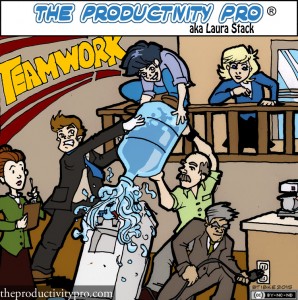
By the time we're in grade school, our teachers heavily emphasize the value of teamwork: "there's no ‘I’ in team," "play well with others," "class participation is part of your grade." And there's nothing wrong with any of that—childhood is rehearsal for life. Play and education are a kid's jobs, because these activities socialize us into our culture, help us learn how to handle other people, and teach us what adults expect of us as we mature. They also prepare us for the reality of working for a living, where few of us accomplish anything entirely alone. On the other hand, some cultures also urge us to be self-reliant, to pick up the slack where no one else will, to be our own people, to work hard for our own goals. The U.S., Britain, Australia, Denmark, and Holland are a few examples … [Read more...]
Too Gung Ho: When Does Initiative Cross the Line?
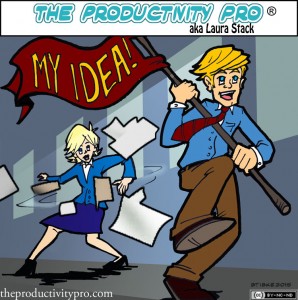
"Employers and business leaders need people who can think for themselves -- who can take initiative and be the solution to problems." -- Steven Covey, American business writer. While I’ve always stressed the importance of taking initiative and owning your job, I'll bet there have been times when you've faced trouble for trying to do just that. Most managers and authority figures say they want initiative, and the majority really do. But the fact remains: some aren't as keen about it as they claim—especially when you color outside the lines. If you take too much initiative, you can become a bother, break their process, or run afoul of micromanagers. Ultimately, how much initiative you should take at work depends on a number of factors. So before you weigh in on something or just jump … [Read more...]
Does Your Team Get Along Too Well? Don’t Hesitate to Disagree!
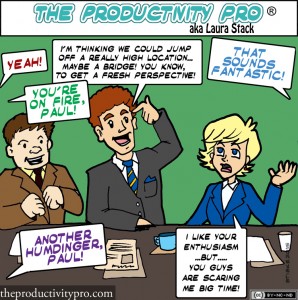
You’ve probably been a member of a team before where everyone automatically agrees about everything. Typically, one person forcefully dominates such teams, to the point where it's easiest to go along with what that person decides just to avoid conflict. But anyone who rubberstamps team decisions is guilty of bad team membership, because this kind of groupthink kills initiative, hurts engagement, and damages productivity. Live Wire or Dead Battery? I'd never recommend that team members go at each other hammer-and-tongs, but a certain level of conflict is healthy. Saying, "I don't think that's our best course of action, and here’s why” is desirable. Even geniuses like Einstein aren't always right. Einstein fought quantum theory at first, but 100 years later it's the best-tested … [Read more...]


